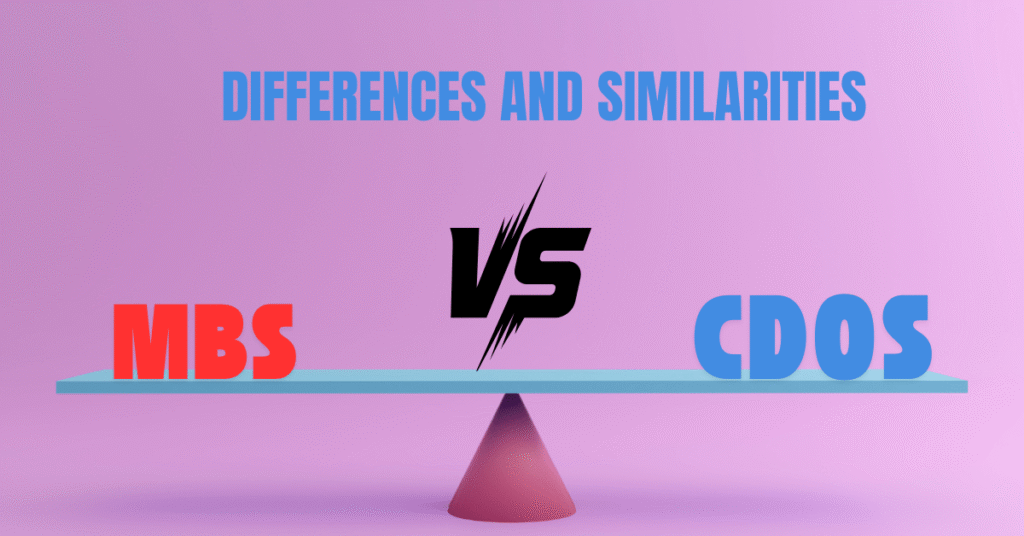Mortgage Backed Securities (MBS) and Collateralized Debt Obligations (CDO) are two commonly used investment vehicles in the world of finance. Both MBS and CDO are intricately linked to the housing market and have played significant roles in the global financial system. In this article, we will explore the differences and similarities between these two investment options.
Mortgage Backed Securities
Mortgage-backed securities are financial instruments that are created by pooling a large number of individual mortgage loans and then selling them as a package to investors. The cash flows generated by the mortgage loans are then divided into different tranches, each with its own level of risk and return. These tranches are then sold to investors as securities.
Here is a comparison between MBS and CDO:
| Aspect | Mortgage Backed Securities (MBS) | Collateralized Debt Obligations (CDO) |
|---|---|---|
| Risk Profile | Medium to High | High |
| Underlying Assets | Mortgage Loans | Variety of Debt Instruments |
| Cash Flow Structure | Sequential | Pro Rata |
| Customizability | Less Customizable | More Customizable |
MBS typically carry a medium to high level of risk. The underlying assets in MBS are mortgage loans, which means the performance of the housing market directly affects the performance of the securities. The cash flow structure of MBS is sequential, meaning that the tranches with higher priority receive payments before the lower priority tranches.
Collateralized Debt Obligations
In contrast, Collateralized Debt Obligations (CDOs) are structured financial products that are backed by a pool of various debt instruments, such as mortgages, corporate bonds, and other loans. The cash flows from these underlying assets are divided into different tranches and sold as securities to investors.
CDOs typically carry a higher level of risk compared to MBS. This is because the underlying assets in CDOs are more diverse and can include riskier debt instruments. The cash flow structure of CDOs is pro rata, which means that each tranche receives a proportionate share of the cash flows.
Differences and Similarities

While MBS and CDOs have some key differences, they also share certain similarities. Here are a few comparisons:
- Risk Profile: Both MBS and CDOs carry a certain level of risk due to their exposure to underlying assets.
- Securitization: Both investment options involve the securitization of underlying assets to create tradable securities for investors.
- Housing Market Dependence: Both MBS and CDOs are highly influenced by the performance of the housing market.
In conclusion, MBS and CDOs are both investment vehicles associated with the housing market, but they differ in terms of risk profile, underlying assets, cash flow structure, and customizability. Understanding these differences can help investors make informed decisions when considering these investment options.
Frequently Asked Questions Of Mortgage Backed Securities Vs CDO: Uncovering The Key Differences
What Is The Difference Between Mortgage securities and CDO?
Mortgage-backed securities (MBS) are pools of mortgage loans that are packaged together and sold to investors. At the same time, Collateralized Debt Obligations (CDO) are a type of MBS that is backed by a variety of debt instruments.
How Do Mortgage-Backed Securities Work?
Mortgage-backed securities work by combining multiple mortgage loans into a single investment product. These products are then sold to investors who receive periodic payments of principal and interest from the underlying mortgage loans.
What Are The Advantages Of Investing In Mortgage securities?
Investing in Mortgage Backed Securities offers a lower risk compared to investing in individual mortgage loans, provides regular income payments, and provides diversification in a portfolio.
Are Collateralized Debt Obligations (CDOs) Riskier Than Mortgage-Backed Securities?
Yes, Collateralized Debt Obligations (CDOs) are generally considered riskier than Mortgage Backed Securities due to the complexity of the underlying debt instruments and the potential for default or devaluation of those instruments.
Ismail Hossain is the founder of Law Advised. He is an Divorce, Separation, marriage lawyer. Follow him.





Leave a Reply